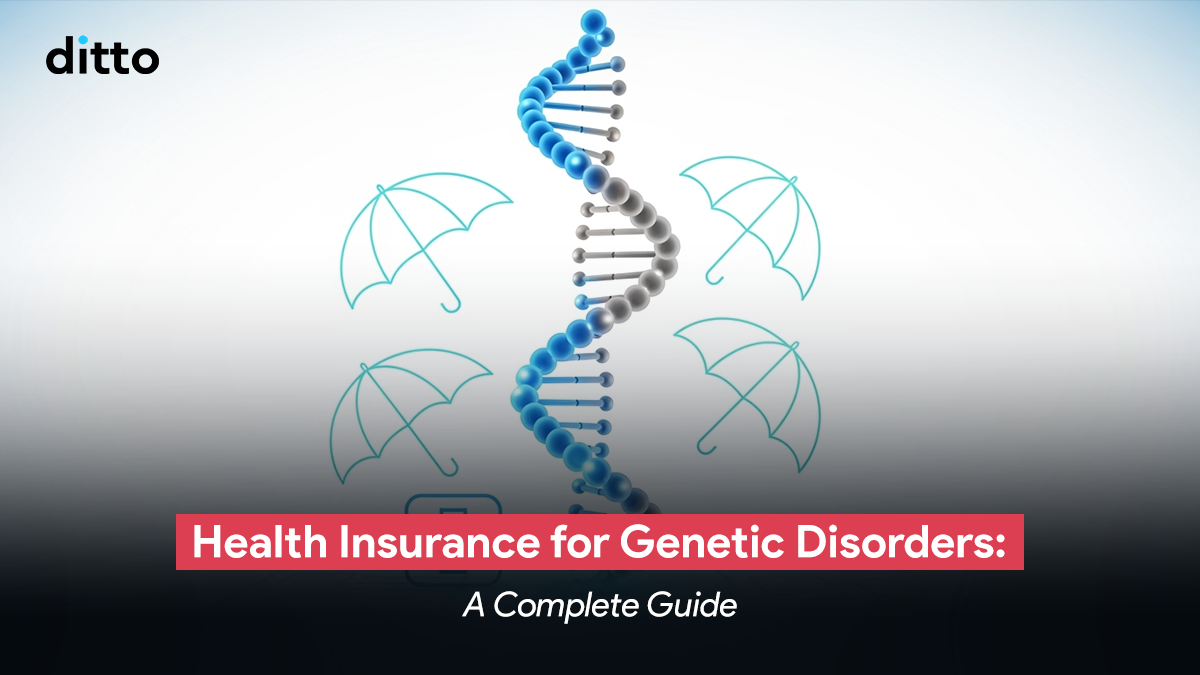Medical costs for genetic disorders can run into lakhs, and until a few years ago, insurers could simply deny these claims. But since IRDAI’s 2018 circular, following the Delhi High Court’s directive, all health insurance policies in India must cover genetic disorders, though the extent of coverage varies widely.
At Ditto, our advisors review hundreds of health insurance claims each month, including those with genetic conditions. Based on policy wordings, IRDAI guidelines, and claim settlement experiences, we have analyzed what gets covered and what doesn’t.
By the end of this article, you will understand how to choose the right health insurance for genetic disorders and learn practical tips to avoid rejection during the application process.
What are the Best Health Insurance Plans for Genetic Disorders?
Although all health insurance policies today cover genetic disorders, we recommend a few standout plans because of their overall comprehensive coverage and strong performance in the market.
Here’s an overview:
Note: If you are exploring these plans for a pre-existing genetic condition, then the issuance will depend on underwriting.
What Kind of Coverage Can I Expect for Genetic Disorders?
The IRDAI has made it clear: insurers can’t permanently exclude internal genetic or congenital disorders. In simple terms, if you buy health insurance today, these conditions are treated just like any other illness, though standard waiting periods may apply.
What Treatments or Expenses Might Not Be Covered?
Even though genetic disorders are covered by insurance, certain treatments and expenses may not be payable under standard terms, such as:
- External Congenital Anomalies: Conditions like cleft lip, cleft palate, or birth defects visible externally are generally excluded.
- Experimental or Unproven therapies: Treatment approaches like gene therapy or experimental trials aren't usually covered yet. Insurers only pay for treatments that are widely accepted by medical boards in India.
- Cosmetic or Corrective Surgeries: Procedures done purely for aesthetic purposes (e.g., reconstructive surgery for cosmetic reasons) are excluded.
- Screening and Standalone Diagnostics: Genetic tests, screenings, or counselling done only for evaluation (without approved inpatient/day care treatment) are not covered.
- Prophylactic or Preventive Surgeries for Genetic Risks: Preventive surgeries for genetic risks, such as a mastectomy for women with a BRCA gene mutation (without a cancer diagnosis), are not covered.
- Non-medical Expenses: Admission charges, registration fees, toiletries, dietary supplements, and consumables not directly related to treatment are excluded (unless covered via an add-on).
Pro tip: Before buying, skim through the “Exclusions” list in your policy brochure. That’s where insurers quietly mention what they won’t pay for; better to know now than get shocked during a claim.
What Happens If I am Diagnosed with a Genetic Disorder Before Buying Health Insurance?
If you already have a genetic disorder before applying for health insurance, insurers will treat it as a pre-existing condition. They don’t just say “no” immediately. Instead, they check how risky or expensive your condition is. Here’s how it usually works:
- For low-risk and stable conditions (like minor thalassemia trait or a controlled congenital heart condition), insurers are usually willing to provide coverage. Sometimes, they may add a waiting period (up to 3 years) before the condition is covered, or they may charge a slightly higher premium.
- For progressive or high-cost disorders (like Huntington’s disease, advanced muscular dystrophy, or cystic fibrosis), insurers may apply stricter conditions. This can include permanent exclusions for complications arising from that disorder, higher co-pays, or, in severe cases, policy denial.
Note: Some genetic disorders involve very high, ongoing treatment costs that are difficult to predict. So, insurers impose restrictions to avoid making premiums unaffordable for all policyholders.
The good news is that you still have certain options if your application is rejected by the insurer:
- Employer-provided group insurance (group policies generally have fewer restrictions).
- Specialized plans such as Care Freedom, Manipal Cigna, or Star Health Special Care Gold, accept higher-risk applicants, though coverage terms may still be limited.
What Happens if a Genetic Condition is Not Disclosed at the Time of Purchase?
If you hide a genetic condition and the insurer finds out later, say during a claim check, they can take strict action. Here’s what can happen:
- Policy Cancellation: The insurer can terminate the policy altogether on grounds of non-disclosure or misrepresentation.
- Condition-Specific Exclusion: In some cases, the insurer may allow the policy to continue but exclude treatment for that particular condition.
- Waiting Period Adjustment: If the condition is not severe, insurers may still accept it under the pre-existing condition clause. They will also apply a standard waiting period while giving credit for time already served.
What If I am Diagnosed with a Genetic Disorder After Buying Health Insurance?
It is generally treated as a new illness, not as a pre-existing condition. This means your insurer should cover it, as long as it fits within your policy rules.
To avoid claim issues later, it’s important to:
- Notify your insurer as soon as the diagnosis is confirmed for better trust and transparency.
- Request a formal endorsement or written acknowledgement of the condition on your policy records.
- Keep all test reports, prescriptions, and hospital records organized for a smooth claim settlement process.
To sum it up, doing this ensures transparency and helps smooth claim settlement when you need treatment.
How Can I Choose the Right Health Insurance for Genetic Disorders?
We asked Gaurav Bhat, a senior advisor at Ditto, and here are his tips:
- Always disclose your family medical history honestly if the insurer asks.
- If you already have a genetic disorder, look for policies that come with minimal waiting periods (via add-ons) so coverage kicks in sooner.
- Compare multiple plans carefully to see which offers better long-term protection and fewer exclusions.
Why Talk to Ditto for Your Health Insurance?
At Ditto, we’ve assisted over 8,00,000 customers with choosing the right insurance policy. Why customers like Abhinav below love us:

- No-Spam & No Salesmen
- Rated 4.9/5 on Google Reviews by 15,000+ happy customers
- Backed by Zerodha
- 100% Free Consultation
You can book a FREE consultation. Slots are running out, so make sure you book a call now!
Health Insurance for Genetic Disorders: Key Takeaways
Health insurance covers genetic disorders in India, but the extent of coverage varies across insurers and depends on waiting periods and exclusions. Meanwhile, here are three quick takeaways to remember:
- Coverage for genetic disorders is mandated, especially if diagnosed after policy purchase.
- Pre-existing genetic conditions may involve loading charges, waiting periods, or a permanent exclusion.
- Choosing a plan with clear terms and fewer restrictions offers long-term security.
FAQs
Can I buy health insurance for my child diagnosed with a genetic disorder?
Yes, but with conditions. You (the parent) must be the proposer since a child can’t apply alone, and most plans require one adult insured. Coverage depends on the insurer, often with waiting periods for genetic disorders, possible exclusions, and premium loading.
Do I need to disclose my family’s medical history when applying for health insurance?
Ideally, you should disclose everything about your family’s medical history when applying for insurance if asked. However, most health insurers’ application forms do not have any questions about family history.
What documents do I need to claim for genetic disorder treatment?
You must provide medical reports indicating diagnosis, including the doctor’s prescription and treatment details. That’s why it is recommended to keep your admission/discharge summaries and other bills and receipts in handy for a smooth claim settlement process.
Last updated on:










